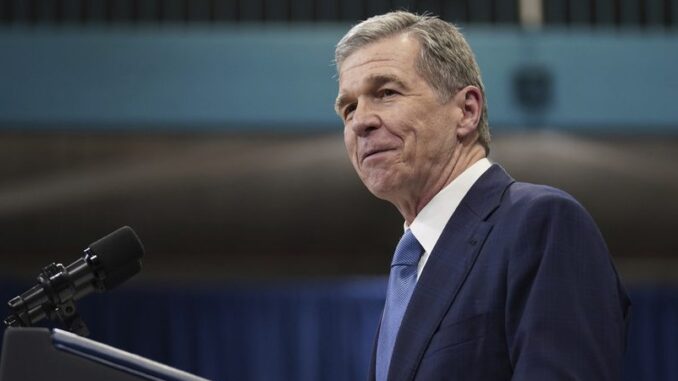
RALEIGH — Gov. Roy Cooper released the final budget proposal of his two-term tenure on April 24.
The 223-page proposal is for FY 2024-2025 and has more than $34.5 billion in appropriations.
“This budget is an opportunity to build on our state’s momentum and make up ground in areas like public education, quality child care and clean drinking water, where legislators have fallen short,” Cooper said in a press release.
“As the number one state to do business in the country for two years in a row, we have the formula for success in our high-quality public schools, talented workforce and thriving economy,” Cooper said. “We must make targeted investments strengthening public education, boosting economic development, and protecting our natural resources to secure a bright future for North Carolina.”
Cooper’s budget prioritizes child care and early education, offers salary increases and retention bonuses for state employees, and invests in workforce training and economic development. Additionally, the budget allocates funds for clean drinking water initiatives, natural resource preservation and disaster resilience efforts.
The proposal includes an 8.5% raise for teachers, a more than $1 billion investment in public schools, and “$10 million to restore master’s pay.”
In the details of the teacher pay proposal, Cooper calls for “increasing pay for over 80,000 existing teachers by an average of 8.5%, including raises of 10% to 19.5% for those in their first nine years of teaching and more frequent raises for veteran educators.”
The governor also wants starting teacher pay to be “the highest in the Southeast” by “increasing it to over $47,500 (including state and local supplements).” As of the most recent state budget, starting teacher pay will increase from $37,000 to $41,000 over the biennium, an increase of 10.8%.
Cooper also calls for a moratorium on the Opportunity Scholarship program that provides funding for students to attend the private school of their choice. House Speaker Tim Moore (R-Kings Mountain) has signaled a budget adjustment to add $300 million to the program during the short session.
Unlike teachers, most state employees will get a 5% raise and variable one-time retention bonuses, the size of which is dependent on what the employee currently earns. Cooper has allotted $40 million for the retention bonuses.
A $1,500 bonus will go to state employees making $75,000 per year or less, and a $1,000 bonus is allocated for all state employees making more than $75,000 per year. The bonuses will not be a lump sum but instead paid in two equal installments on Oct. 1, 2024, and in April 2025.
The top spending line items include:
- $2.5 billion: Proposed General Obligation Bond for public school construction and renovation.
- $1 billion: Investment in North Carolina’s public schools to fuel economic growth and position students for success.
- $745 million: Investment in child care and early education for working families.
- $730.3 million: Investment in public school students and teachers to secure North Carolina’s future, including raising teacher pay by 8.5%.
- $251.8 million: Investment to guarantee at least a 5% across-the-board salary increase for state-funded employees.
- $197 million: To raise N.C. pre-K slot reimbursement rates in all settings to cover the full cost of care and raise the administrative rate from 4% to 10%.
- $195.8 million: Funding for the Enhanced Labor Market Adjustment Reserve to address labor market challenges.
- $100 million: Establishment of a fund to help communities clean their water from pollutants such as PFAS.
- $148 million: To conserve the state’s land and water resources and to build community resilience to natural disasters
- $400 million: Retention bonus for all state-funded employees.
In other education-related spending, the governor also wants to extend the Read to Achieve program “through grade 8,” and he allotted $44.6 million for school counselors, nurses, social workers and psychologists.
In a statement, North Carolina Democratic Party Chair Anderson Clayton praised the proposal.
“It invests over $1 billion in public education instead of wasting more money on taxpayer-funded private school vouchers and supports strong economic development to continue our historic growth,” Clayton said of Cooper’s final budget proposal.



